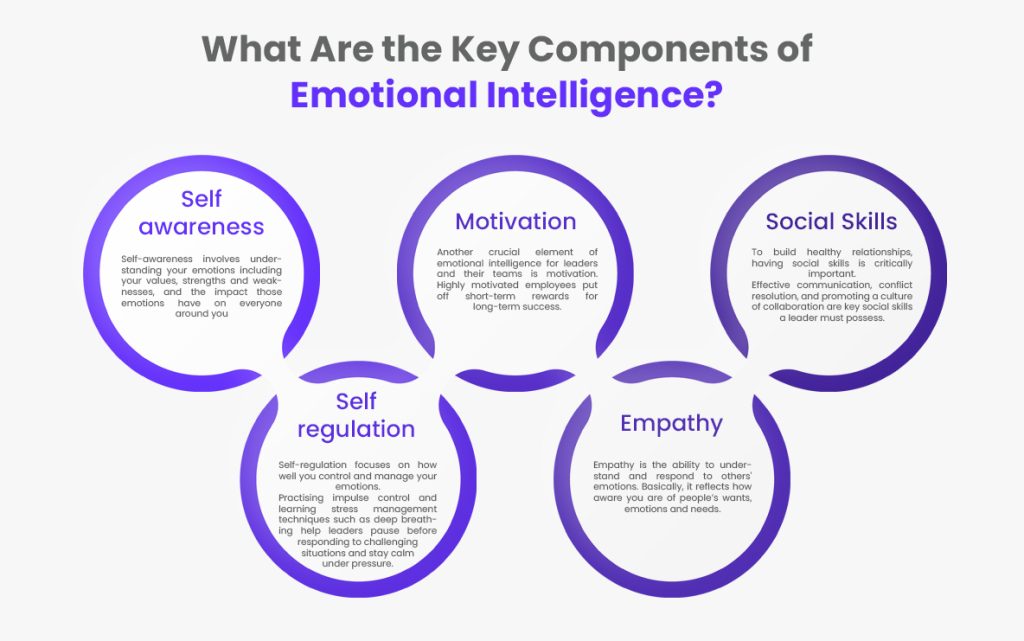
Emotionally intelligent leaders are smart with human connections and relationships. Almost every decision we make is based on emotions. But effective leaders are those who never let their emotions get the best of them. Employees with managers having a high degree of emotional intelligence are 4 times less likely to leave your organisation than those having managers with a lower degree of emotional intelligence. There’s a great saying by Oprah Winfrey: “Leadership is about empathy. It’s about relating to and connecting with people to inspire and empower their lives.” In this blog, we discuss how emotional intelligence benefits your leadership skills and find out five ways to create a dynamic team by incorporating emotional intelligence in the workplace.
What is Emotional Intelligence?
Emotional Intelligence is the ability to recognise and manage your own emotions and perceive the emotions of those around you. An understanding of other people’s emotions builds a base for better social interactions with avoidance of potential conflicts.
Leaders with high emotional intelligence stay calm under pressure, resolve conflicts effectively and build long-term relationships with their teams.
Why Emotional Intelligence Matters in Leadership?
Emotional Intelligence matters immensely for business success.
As a leader, when you have determined a strategy for the achievement of future goals, only people can get it implemented. This is why you need to have a good grasp on your emotions to be able to communicate your goals and strategy effectively and persuade them to work towards it.
Emotional intelligence helps leaders stay cool under pressure, manage stress and create a positive work culture with a collaborative and inclusive approach. In a 2011 survey, 71% of employers valued Emotional Quotient (EQ) over IQ and other technical skills because employees with high EQ resolve conflict more effectively and are more likely to respond to co-workers empathetically.
What Are the Key Components of Emotional Intelligence?
There are five components of Emotional Intelligence. Let’s discuss each of these briefly:
1. Self-awareness
Self-awareness involves understanding your emotions including your values, strengths and weaknesses, and the impact those emotions have on everyone around you. The more self-aware a leader is, the more emotionally intelligent they will be.

In order to stay focused in the present and develop self-awareness, a leader must engage in mindfulness exercises. Seeking feedback from colleagues, practising self-reflection through journaling and undergoing personality assessments also help gain insights into our behavioural tendencies.
2. Self-regulation
Self-regulation focuses on how well you control and manage your emotions.
Practising impulse control and learning stress management techniques such as deep breathing help leaders pause before responding to challenging situations and stay calm under pressure.
As a leader, your ability to adapt to changes and maintain a positive outlook are beneficial in enhancing self-regulation.
3. Motivation
Another crucial element of emotional intelligence for leaders and their teams is motivation. Highly motivated employees put off short-term rewards for long-term success.
Intrinsic motivation, driven by personal satisfaction, and extrinsic motivation, stemming from external rewards, both play a role. Leaders can boost motivation by setting clear and achievable goals, providing meaningful work that aligns with employees’ values, and recognising and celebrating their achievements.
4. Empathy
Empathy is the ability to understand and respond to others’ emotions. Basically, it reflects how aware you are of people’s wants, emotions and needs.
Empathetic managers put themselves in others’ shoes, validate their emotions, and respond to their needs and wants with compassion and understanding. You can develop empathy by practising active listening and engaging in perspective-taking exercises to see situations from others’ viewpoints.
5. Social Skills
To build healthy relationships, having social skills is critically important.
Effective communication, conflict resolution, and promoting a culture of collaboration are key social skills a leader must possess. This helps you work positively with people part of your organisation and achieve goals together in a productive and healthy way.
How to Lead with Emotional Intelligence for Success?
Communication is key to successful leadership, and emotional intelligence plays a significant role in effective communication. The idea is to express your views assertively yet respectfully while validating others’ perspectives.
Leaders can apply Emotional intelligence in day-to-day situations, like giving constructive feedback, motivating struggling team members and making wise decisions.
Many successful leaders like Satya Nadella and Mary Barra are well-known for their high Emotional Intelligence and empathetic leadership style which has helped them sail through challenging times. By mastering emotional intelligence, you can also enhance your ability to communicate effectively, collaborate with others and resolve conflicts.
Developing Your Own Emotional Intelligence for Positive Leadership Impact
Developing emotional intelligence at the workplace involves cultivating self-awareness, self-regulation, empathy, and social skills. This can be achieved through training, workshops, self-reflection, and continuous practice.
Follow these steps to develop your emotional intelligence for positive leadership impact:
1. Take time to reflect on your emotions, values and behaviours. Consider how your emotions influence your decision-making and interactions with others.
2. Practice deep breathing techniques to regulate your emotions especially, in high-pressure situations.
3. Show genuine concern and compassion for others’ feelings and experiences, building a culture of trust.
4. Be clear, concise, and empathetic when communicating with others.
5. Only when you embrace changes as an opportunity for growth and innovation, you develop a culture of resilience and flexibility.
Leaders with high Emotional intelligence take responsibility for their actions, create a culture of accountability, and cultivate stronger relationships through communication and empathy. This, in turn, leads to a more supportive and collaborative work environment where people easily navigate challenging times with resilience.
Follow me on LinkedIn
Frequently Asked Questions
1. How to develop Emotional Intelligence?
Employees now care about what their leaders think of them. One of the most important ways to lead effectively is by developing emotional intelligence.
1. Begin by reflecting on your own emotions, and behaviour.
2. Work on understanding and resonating with the emotions of others.
3. Improve your ability to communicate with clarity, empathy, and active listening.
4. Invest time in building authentic and meaningful connections with others.
2. How to improve emotional intelligence in the workplace?
To improve emotional intelligence in the workplace:
1. Offer training on Emotional Intelligence skills like self-awareness and empathy.
2. Encourage self-reflection through regular assessments.
3. Promote collaboration and teamwork, celebrating diversity and inclusion.
4. Cultivate a culture of open communication and provide resources for conflict resolution.



